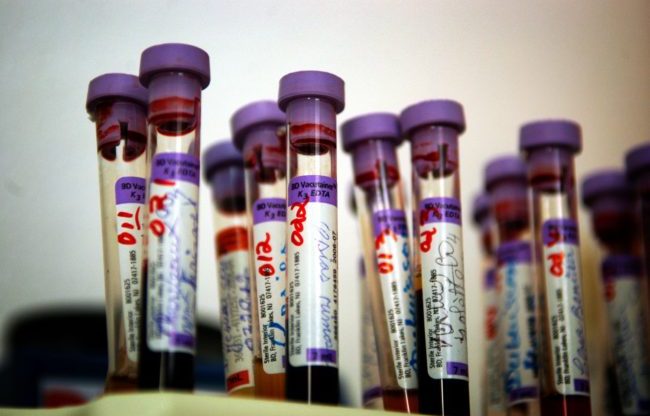British scientists could be on the brink of creating a cure for HIV

HIV testing should become part of routine healthcare, the HIV Commission says. (Getty)
A British man living with HIV could become the first person to be cured of the disease as scientists edge closer to a irreversible cure.
Scientists and doctors from five leading British universities teamed up to design the cure. 50 people took part in a trial of the treatment and one patient is showing signs that he might be cured.

The 44 year old man’s early tests failed to detect any trace of HIV in his system. However, those working on the trial programme expect to wait for a few months longer before confirming whether the treatment has worked fully.
The newly developed therapy differs from other HIV treatments because it targets dormant cells in order to destroy HIV in every part of the body.
If the tests prove to be successful it could become a permanent cure for HIV.
Speaking to The Times, the patient, a social care worker in London, said: “It would be great if a cure has happened. My last blood test was a couple of weeks ago and there is no detectable virus.”
“However, that could be the anti-retroviral therapies, so we have to wait to be sure.”
“I took part in the trial to help others as well as myself. It would be a massive achievement if, after all these years, something is found to cure people of this disease. The fact that I was a part of that would be incredible,” he added.
Scientists and doctors have acknowledged this early undetectable test result could be a cause of the conventional drugs the patient has been taking which can temporarily clear the body of the disease.
The treatment differs from the commonly used anti-retroviral therapy (Art) because it targets dormant cells which are infected with the disease.
Mark Samuels, managing director of the National Institute for Health Research Office for Clinical Research Infrastructure, which set up the medical consortium, said: “This is one of the first serious attempts at a full cure for HIV. We are exploring the real possibility of curing HIV. This is a huge challenge and it’s still early days but the progress has been remarkable.”
Oxford, Cambridge, Imperial College London, University College London and King’s College London have all collaborated on the treatment.
Professor Sarah Fidler, a consultant physician at Imperial College London, said: “This therapy is specifically designed to clear the body of all HIV viruses, including dormant ones.”
“It has worked in the laboratory and there is good evidence it will work in humans too but we must stress we are still a long way from any actual therapy.”
“We will continue with medical tests for the next five years and at the moment we are not recommending stopping Art but in the future depending on the test results we may explore this.”
Currently, treatment for HIV costs £380,000 for one persons lifetime. However, a number of new treatments are being developed for the disease, including PrEP.
Pre-Exposure Prophylaxis (PrEP) drug Truvada can reduce people’s chances of being infected with HIV by up to 99 percent, if taken daily.
The High Court recently overturned the NHS decision not to commission HIV-preventing PrEP drugs.
A government minister claimed there is not enough money to fund PrEP, despite no official cost-effectiveness analysis having taken place and experts projecting it would save money in the long term.
NHS England have been accused of ‘feeding media’ negative stories about HIV-preventing PrEP drugs.

